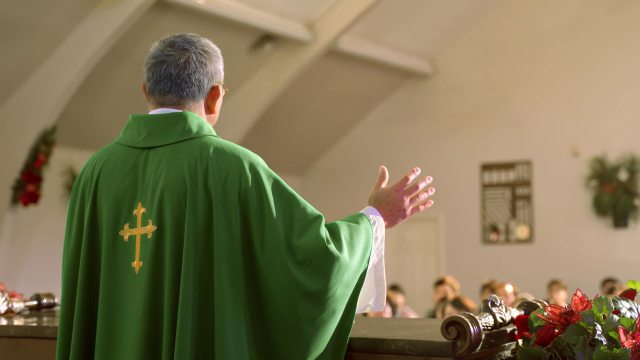Christian Forum: Is God in the Image of a Jew?
Several days ago, Preacher Yang Fan was communicating with some brothers and sisters. When she asked them what subject they would like to fellowship about, Brother Xiangguang said, “The prophecies about the Lord’s return have been fulfilled. It’s very likely that the Lord has already returned. What about taking this opportunity tonight to discuss the question about how we should welcome the Lord’s return? What do you guys say?”
Nianen said happily, “I agree! We should discuss it. Well, in treating the Lord’s return, this was my opinion: Two thousand years ago, God was incarnated in the image of a Jew to do His work in Israel. So, when the Lord comes again in the last days, He should still descend among us in the same image. As long as we can recognize the image of the Lord Jesus, we can welcome the Lord’s return. However, recently I heard someone say this: ‘God has great power and fills all in all. It’s wrong that we define the image of God as that of a Jew; it’s completely out of man’s conceptions and imagination. If we stubbornly hold on to this viewpoint, we will never be able to welcome the Lord’s return.’ Hearing these words, I felt confused: Is what we hold on to wrong? But this viewpoint is held by many pastors and elders. They are people who serve God in the church, how can they be wrong? But thinking that it’s a problem which involves the matter of whether we can welcome the Lord’s return, I feel uneasy in my heart. So, I want to discuss it with you: Will the Lord Jesus still be in the image of a Jew when He returns?”
Hearing this, Jia Muyi said: “You can’t be confused in this problem. It is recorded in the Bible: ‘You men of Galilee, why stand you gazing up into heaven? this same Jesus, which is taken up from you into heaven, shall so come in like manner as you have seen him go into heaven’ (Act 1:11). Since the Lord Jesus left upon a cloud in the image of a Jew, then it is self-evident that He will certainly bear the image of a Jew when he comes again. This is without a doubt!”

Xiangguang refuted: “The Lord will bear the image of a Jew when He returns; otherwise, He cannot be God. Do you dare to confirm that? Can we humans confine this? Hearing you talk like this, I suddenly think of the Pharisees. They decided that when the Lord came, He would certainly be born in a palace, with a heroic bearing and commanding presence, and be called Messiah. However, when the Lord came, He was born in a manger in Bethlehem, He was ordinary in outward appearance, and He was called Jesus. The Pharisees didn’t have reverence for God in their hearts, nor did they seek the truth in the slightest, but just relied on their conceptions and imagination to define and resist the Lord Jesus; at last, they made an alliance with the Roman government to nail the Lord Jesus to the cross. If we arbitrarily define God with our conceptions and imagination, then aren’t we the same as the Pharisees? This question is very important; it is related to whether we can welcome the Lord Jesus and it involves our destination and outcome. We must speak and think about it carefully.”
Nianen said: “Yep. Just think and we will know the consequences are serious. The Bible says: ‘O the depth of the riches both of the wisdom and knowledge of God! how unsearchable are his judgments, and his ways past finding out! For who has known the mind of the Lord? or who has been his counselor?’ (Rom 11:33–34). God’s deeds are wondrous and unfathomable. No man can confine God’s work. What image the Lord will bear when He comes again in the last days to work and save mankind is arranged by the Lord Himself. We humans can’t arbitrarily judge or speculate this matter. In truth, if we consult the Bible carefully, it’s not difficult to find that God’s image is not fixed. For example, the Bible says, ‘And Jehovah appeared to him in the plains of Mamre: and he sat in the tent door in the heat of the day; And he lift up his eyes and looked, and, see, three men stood by him: and when he saw them, he ran to meet them from the tent door, and bowed himself toward the ground’ (Gen 18:1–2). Here, Jehovah God appeared to Abraham in the image of man. Exodus 3:2–4 says: ‘And the angel of Jehovah appeared to him in a flame of fire out of the middle of a bush: and he looked, and, behold, the bush burned with fire, and the bush was not consumed. And Moses said, I will now turn aside, and see this great sight, why the bush is not burnt. And when Jehovah God saw that he turned aside to see, He called to him out of the middle of the bush, and said, Moses, Moses. And he said, Here am I.’ We can see here Jehovah God appeared to Moses in the form of fire burning in the bush.”
Xiangguang went on to say: “Now I think of several verses. Ezekiel 1:26–28 says: ‘And above the firmament that was over their heads was the likeness of a throne, as the appearance of a sapphire stone: and on the likeness of the throne was the likeness as the appearance of a man above on it. And I saw as the color of amber, as the appearance of fire round about within it, from the appearance of his loins even upward, and from the appearance of his loins even downward, I saw as it were the appearance of fire, and it had brightness round about. As the appearance of the bow that is in the cloud in the day of rain, so was the appearance of the brightness round about. This was the appearance of the likeness of the glory of Jehovah. And when I saw it, I fell on my face, and I heard a voice of one that spoke.’ Obviously, when God appeared to Ezekiel, the image of God he saw was ‘the likeness as the appearance of a man’ with brightness round about above on the throne. And it is recorded in Matthew 17:1–2: ‘And after six days Jesus takes Peter, James, and John his brother, and brings them up into an high mountain apart, And was transfigured before them: and his face did shine as the sun, and his raiment was white as the light.’ From these verses, we can see that when the Lord Jesus brought His disciples up a mountain and was transfigured, He was not in the former appearance but had changed His form.”
Yang Fan gave a glance at them and said: “Yeah. There are still many other verses about this aspect. Let’s see Revelation 1:13–16: ‘And in the middle of the seven candlesticks one like to the Son of man, clothed with a garment down to the foot, and girt about the breasts with a golden girdle. His head and his hairs were white like wool, as white as snow; and his eyes were as a flame of fire; And his feet like to fine brass, as if they burned in a furnace; and his voice as the sound of many waters. And he had in his right hand seven stars: and out of his mouth went a sharp two edged sword: and his countenance was as the sun shines in his strength.’ The appearance of the Son of man John saw on the island of Patmos is different from the image of the Lord Jesus. God was neither in the image of a Jew nor in the image of the resurrected Lord Jesus. From this, it can be seen that each time God appears to man He is in a different image. This also makes me understand that although the Lord Jesus once appeared and worked among man in the image of a Jew, He can also appear to man in different images. As such, how can we say that the Lord Jesus will still be in the image of a Jew when He comes again? And how can we say that the returned Lord who isn’t in the image of a Jew is not God? I’d like to fellowship a passage of words with everyone: ‘God being the greatest throughout the universe and in the realm above, could He fully explain Himself using the image of a flesh? God clothes Himself in this flesh in order to do one stage of His work. There is no particular significance to this image of the flesh, it bears no relation to the passing of ages, nor does it have anything to do with God’s disposition. … When God becomes flesh, He merely descends from heaven into a particular flesh. It is His Spirit that descends into a flesh, through which He does the work of the Spirit. It is the Spirit that is expressed in the flesh, and it is the Spirit who does His work in the flesh. The work done in the flesh fully represents the Spirit, and the flesh is for the sake of the work, but that does not mean that the image of the flesh is a substitute for the true image of God Himself; this is not the purpose or the significance of God become flesh. He becomes flesh only so that the Spirit may find a place to reside that suits His working, the better to achieve His work in the flesh, so that people can see His deeds, understand His disposition, hear His words, and know the wonder of His work. … His appearance in the flesh bears no relation to His management, being merely for the sake of His work at the time. Yet it is impossible for God incarnate to have no particular appearance, and so He chooses the appropriate family to determine His appearance. If the appearance of God were to have representative significance, then all those who possess facial features similar to His would also represent God. Would that not be an egregious mistake? … God is Spirit, and man will never be capable of encompassing what His image is in the final analysis. His image can only be represented by His disposition. As for the appearance of His nose, of His mouth, of His eyes, and of His hair, these are beyond your capacity to encompass’” (“The Vision of God’s Work (3)”).
After reading these words of God, Yang Fan continued: “This passage of words is very clear. God originally is Spirit, who is formless, fills all in all, and is rich and bountiful. God has no particular image. No matter whether God appears to mankind and does His work in a spiritual body or in a flesh, He will choose an appropriate image based on the needs of the work. God became flesh as the Lord Jesus in the image of a Jew, which is for better working among man and also for man being able to draw close to God, know God’s disposition and work through what God says and does, and understand God’s accurate will and requirements. However, the appearance of the flesh cannot represent God’s original essence. When God’s work ends, this appearance will disappear and God will return to His original position. So, it is completely wrong to believe that since God once appeared to us in the image of a Jew, He will still show Himself in the same image later. God doesn’t hope that we confine Him within a fixed image. As for in what image the Lord will appear to people when He comes again, it’s God’s own business. We humans should obey God’s work with a heart that reveres God, and should not use our conceptions and imagination to define the Lord. Isn’t it right?”
Nianen said: “Thank the Lord. Through the fellowship today, I gained more understanding that God is almighty and wise, wondrous and unfathomable, He has no fixed image, and it’s based on the needs of the work that He takes an appropriate image and works among man. We can’t define God within one image, lest we offend God’s disposition. Alas! It can be seen that if we don’t understand the truth or know God, we will unavoidably define God with our imagination, and walk the path of resisting God. Then, how should we welcome the Lord’s return? Sister, please fellowship some more about this with us.”
Yang Fan said: “OK. Thank the Lord. Then, I’d like to fellowship some more of my understanding. In fact, about how to welcome the Lord’s return, the prophecies in the Bible have given us some directions. The Lord Jesus said: ‘And at midnight there was a cry made, Behold, the bridegroom comes; go you out to meet him’ (Mat 25:6). There are also prophecies in Revelation: ‘He that has an ear, let him hear what the Spirit says to the churches’ (Rev 2, 3). ‘Behold, I stand at the door, and knock: if any man hear my voice, and open the door, I will come in to him, and will sup with him, and he with me’ (Rev 3:20). The utterances of the Holy Spirit refer to the voice of the Lord, that is, the words said by the Lord when He appears to work in the last days. So, in the matter of welcoming the Lord’s return, we should pay attention to listening to the Lord’s voice, seeking what the Spirit says to the churches, and finding where there is the work of the Holy Spirit and the expression of the truth; this is the most crucial thing. If we don’t seek what the Spirit says to the churches nor turn our preposterous viewpoints around, but just blindly wait for the Lord Jesus to return in the image of a Jew, then we will become foolish virgins and become abandoned by the Lord. This will be a pity.
Xiangguang said: “Right. The more we debate, the clearer our understanding of the truth becomes. When we investigate the true way and welcome the Lord’s return, we should focus on listening to the Lord’s voice; this is the only right way. It makes me think of Peter, John, Matthew, Nathanael, and others. They all recognized, through His words and work, that the Lord Jesus was the Messiah prophesied to come, so they followed Him, gaining the Lord’s salvation. All of them are examples whom we should follow. The Lord Jesus said: ‘Blessed are the poor in spirit: for theirs is the kingdom of heaven’ (Mat 5:3). ‘Blessed are they which do hunger and thirst after righteousness: for they shall be filled’ (Mat 5:6). ‘Blessed are the pure in heart: for they shall see God’ (Mat 5:8). We should conduct ourselves according to the Lord Jesus’ requirements, and pay attention to listening to God’s voice like the wise virgins. Only thus can we welcome the Lord’s return.”
They all nodded their agreement. Then they discussed where to seek God’s appearance and work …
»You may be interested in reading more on our Gospel of Jesus Christ page about Waiting for Jesus’ Return.





